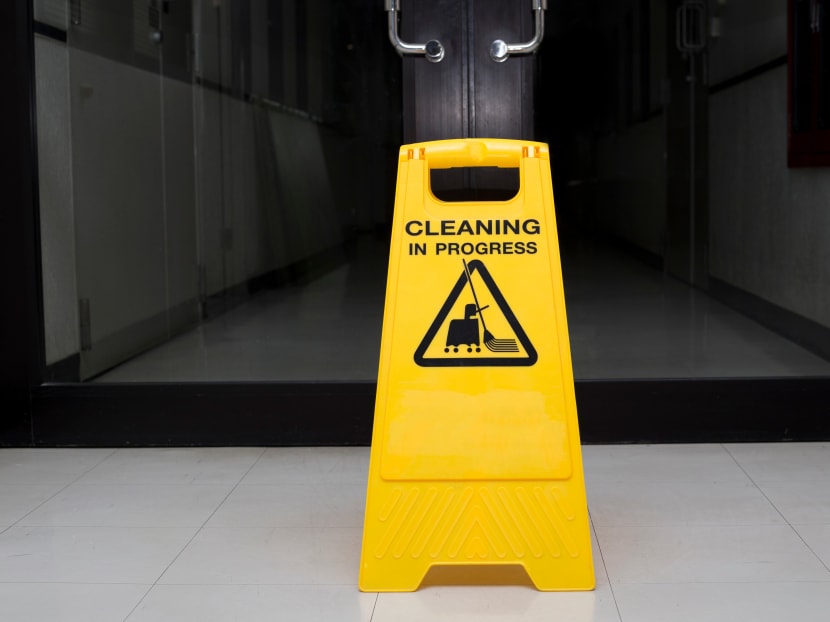Explainer: How residences and commercial buildings exposed to the Wuhan virus should be disinfected
SINGAPORE — With the number of confirmed cases of the coronavirus rising to 10 here on Wednesday (Jan 29), members of the public have taken to telling friends and relatives to stay away from areas where infected patients have been.

Cleaning crew should wear gloves, disposable long-sleeved gowns, eye goggles and an N95 mask as protective personal equipment while carrying out disinfection works, the National Environment Agency said.
SINGAPORE — With the number of confirmed cases of the coronavirus rising to 10 here on Wednesday (Jan 29), members of the public have taken to telling friends and relatives to stay away from areas where infected patients have been.
Before they were hospitalised, the 10 patients — who are all Chinese nationals from Wuhan, China — had been to several locations around Singapore. They include integrated resort Marina Bay Sands, hotels on Sentosa Island, Orchard Road and Gardens by the Bay.
In upkeeping environmental hygiene, the onus is on homeowners and building owners or management to carry out proper infection control after an individual there is confirmed as having the virus.
The National Environment Agency (NEA) on Wednesday issued a new set of interim guidelines to help residents and business operators in cleaning and disinfecting areas that may have been exposed to the Wuhan coronavirus. An earlier version of the guidelines was released on Sunday.
These guidelines have been developed in consultation with the Ministry of Health and the National Centre for Infectious Diseases.
The full guidelines can be found on NEA’s website, for both residents and operators of commercial premises.
However, NEA cautioned that the guidelines are not set in stone, because the way that this new strain of coronavirus spreads is still not ascertained.
“These guidelines are interim in nature, and will be updated as more is known,” the agency said.
GUIDELINES FOR RESIDENTS
Among other measures, residents who suspect that their homes have been exposed to the virus should:
Sanitise their homes by mopping the floor with disinfectant at least twice. While doing this, they should avoid going from an area that has not been cleaned to an area that has been cleaned.
Use a cloth soaked with disinfectant or bleach to wipe all frequently touched areas, such as handles, doorknobs, switches and tables.
Remove bedsheets, pillow covers, blankets and other fabrics and wash them in a washing machine with detergent.
If a person is still being tested, the mattress, pillows, carpets and cushions that they used should not be used until the patient has tested negative for the virus.
All cloths and rags used, as well as the waste from the clean-up, should be thrown away in double-lined trash bags. This waste should be segregated from other household waste and disposed of as regular waste as soon as possible.
Individuals should shower and change their clothes immediately after the clean-up. After that, they should air and ventilate their home.
GUIDELINES FOR OPERATORS OF COMMERCIAL PREMISES
For owners and operators of non-healthcare commercial premises which are confirmed to have been exposed to the virus, they should:
Where possible, seal off the areas where the infected patient had visited before carrying out cleaning and disinfection processes. This is to prevent unsuspecting people from entering and being exposed to these surfaces.
Floors should be mopped with bleach and frequently touched areas such as door knobs, handrails, and lift buttons, as well as toilet surfaces should be wiped with chemical disinfectant, before being allowed to air dry.
Walls up to 3m high and blinds should be wiped down with bleach.
Curtains, fabrics and quilts should be removed and washed in a washing machine, preferably using hot water that is at least 70ºC.
Cleaning equipment made of cloths and absorbent materials —for instance, mop heads and wiping cloths — should be discarded into biohazard bags after disinfecting each area to prevent cross-contamination. This is because it is not easy to disinfect these materials after use.
Non-porous cleaning equipment used in one room should be disinfected before being used in the next. If possible, they should be kept separately from other routine equipment.
Pails should be disinfected using bleach, disinfectant solution or rinsed in hot water before they are filled up again.
Once the clean-up process is completed, the disinfected area should be left unused until the next day, while biohazard bags should be properly disposed of through one of the licensed biohazard waste collectors listed on NEA’s website.
Disinfectants should be applied to surfaces using a damp cloth rather than using a spray pack because coverage is uncertain and spraying may promote the production of aerosols, NEA said.
Cleaning crew should wear gloves, disposable long-sleeved gowns, eye goggles and an N95 mask as protective personal equipment while carrying out disinfection works.
If gloves become soiled or damaged during the process, they should be removed, discarded and replaced with a new pair.
After the disinfection process is over, the cleaning crew should wash their hands with soap and water after removing their protective personal equipment.
For disposable gowns and biohazard bags, these may be bought online, or the operators working with companies for cleaning supplies will be able to get them. There is also a list of cleaning companies accompanying the guidelines on the agency’s website.
SANITATION ADVISORIES FOR VARIOUS SECTORS
NEA also issued sanitation and hygiene advisories to hotels, public and private transport operators, and food and beverage outlets including hawker centres.
These stakeholders own or operate premises and facilities with high public access, it said, adding that it is also working with other agencies and sectors to issue similar advisories to other communities.








